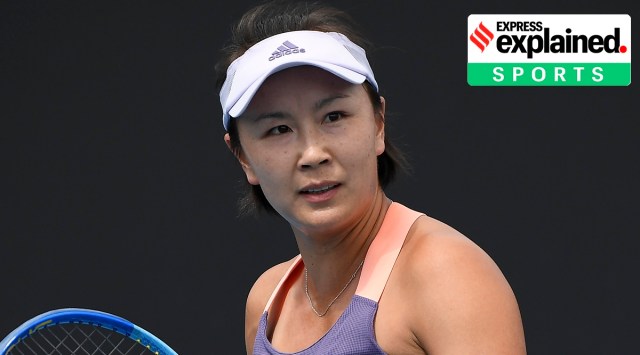Women’s Tennis Association (WTA), the organisation representing women tennis players globally, announced on Thursday (April 13) its return to China around two years after it began a boycott on matches there, in response to sexual assault allegations from – and the brief disappearance of – Chinese player Peng Shuai.
“The WTA took a stance and suspended its operation of events in China out of concern for her safety and the safety of our players and staff…We received much praise for our principled stand and believe we sent a powerful message to the world. But praise alone is insufficient to bring about change,” said the WTA in a statement.

Adding that the situation showed “no sign of changing” even after 16 months, it announced the resumption of tournaments from this September. What was the boycott about and why was it implemented? We take a look.
Story continues below this ad
Who is Peng Shuai?
Peng is a 37-year-old professional tennis player who has achieved notable success in her doubles career particularly, winning 23 titles – including winning at the Wimbledon and the French Open. She was ranked the no. 1 player in 2014 as a doubles player, peaked at no. 14 as a singles player, and has appeared at three Olympic Games.
According to the Olympics’ website, the trio of Chinese players Peng, Li Na and Zheng Jie in the mid-2000s achieved significant success in the sport and helped fuel a “$4 billion tennis boom” in China. They also went against the existing system in their country that set the terms for how many events athletes would compete in, the share the state would get of their earnings, who would coach them, etc. by demanding more independence.
In February 2014, a year after winning the doubles crown at the Wimbledon with her partner Hsieh Su-wei of Taiwan, Peng rose to become the world No. 1 in doubles, the first Chinese player (male or female) to attain the top rank in either singles or doubles.
Story continues below this ad
Her good run continued, but in 2018, she was barred from professional play for six months, with a three-month suspension, after she was found to have tried to use “coercion” and financial incentives to change her Wimbledon doubles partner after the sign-in deadline. She has not competed professionally since early 2020.
What was the incident relating to Peng?
In a now-deleted November 2021 post on Weibo, a social media app in China, Peng described being coerced into having sexual relations with Zhang Gaoli, a former vice premier and member of the ruling Chinese Communist Party’s Politburo Standing Committee.
The post read like a letter to Zhang, where she questioned his actions at a house where he met Peng with his wife. According to a translation of the post reported by the Associated Press, she wrote, “That afternoon, I was very scared, I didn’t think it would be like this, one person on the outside keeping a lookout”.
Peng recalled first meeting him many years prior in the letter, but stated he then lost contact with her. “Originally, I buried all this in my heart, since it didn’t seem like you would take responsibility, why would you even come find me again, take me to your house and force me to have sexual relations with you?”
Story continues below this ad
The post was soon deleted, and Peng disappeared from public view for a while. She was then seen at a tournament and began posting on social media again. An interview of hers was later scheduled with the French media outlet L’equipe. She termed the incident to be a misunderstanding, saying, “Sexual assault? I never said that anyone made me submit to a sexual assault…This post resulted in an enormous misunderstanding from the outside world.” On being asked why she deleted the post, she said, “Because I wanted to.”
The events prompted international concern about her well-being as high-profile critics of the Chinese government have at times in the past gone missing, only to reappear without an explanation, with a changed tone about the establishment. For instance, actress Fan Bingbing was not seen for a few months in 2018 after it was reported she was involved in tax evasion. She reappeared in 2019 and apologised for violating the law, reaffirming her love for the country and the government.
How did the world and the WTA react then?
Steve Simon, the head of the WTA, then called on Beijing to investigate Peng’s accusations and stop trying to bury her case. He told CNN that the WTA was prepared to pull its business out of China over the matter and was applauded for the decision.
Tennis stars Naomi Osaka, Roger Federer, Novak Djokovic, Serena Williams and Rafael Nadal all spoke out in support of Peng. The Biden administration and United Nations human rights office demanded Beijing provide proof of Peng’s well-being.
Story continues below this ad
Meanwhile, China has reiterated that Peng is safe and there is no cause for worry. The IOC President Thomas Bach held a face-to-face meeting with Peng at the time of the winter Olympics in Beijing in 2022. Simon, however, has criticised the fact that the WTA has been unable to contact her directly.
And why might the WTA be returning to China?
A big reason could be economics. The WTA’s decision to suspend events in China was expected to have cost the tour hundreds of millions of dollars in broadcasting and sponsorship, the AP reported, but added the losses are difficult to quantify as the timing coincided with the COVID-19 pandemic, which saw cancellations of major sporting events as well.
Still, the opportunities in China were lucrative. The WTA Tour had staged nine tournaments with a total prize purse of $30.4 million in China in 2019, its last full year of operations in the country, Reuters reported.
Story continues below this ad
The latest WTA’s statement also said, “With the suspension, we forfeited our ability to provide women in the region with opportunities to advance professionally through tennis and be role models for future generations.” While focusing on Peng’s safety, it said, “It is important that our renewed engagement in China provides continued safety for Peng and all the women athletes…It is essential that women’s voices must be heard when speaking out.”
Men’s tennis – which is governed by the Association of Tennis Professionals or the ATP – also prepares to return to China later in 2023 after a break due to COVID-19. The International Tennis Federation (ITF), which will stage five women’s and four men’s events in June, welcomed the WTA’s statement as well.








































